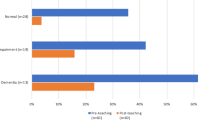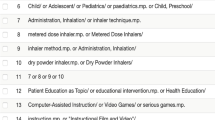ABSTRACT
BACKGROUND
Hospitalized patients frequently misuse their respiratory inhalers, yet it is unclear what the most effective hospital-based educational intervention is for this population.
OBJECTIVE
To compare two strategies for teaching inhaler use to hospitalized patients with asthma or chronic obstructive pulmonary disease (COPD).
DESIGN
A Phase-II randomized controlled clinical trial enrolled hospitalized adults with physician diagnosed asthma or COPD.
PARTICIPANTS
Hospitalized adults (age 18 years or older) with asthma or COPD.
INTERVENTIONS
Participants were randomized to brief intervention [BI]: single-set of verbal and written step-by-step instructions, or, teach-to-goal [TTG]: BI plus repeated demonstrations of inhaler use and participant comprehension assessments (teach-back).
MAIN MEASURES
The primary outcome was metered-dose inhaler (MDI) misuse post-intervention (<75% steps correct). Secondary outcomes included Diskus® misuse, self-reported inhaler technique confidence and prevalence of 30-day health-related events.
KEY RESULTS
Of 80 eligible participants, fifty (63%) were enrolled (BI n = 26, TTG n = 24). While the majority of participants reported being confident with their inhaler technique (MDI 70%, Diskus® 94%), most misused their inhalers pre-intervention (MDI 62%, Diskus® 78%). Post-intervention MDI misuse was significantly lower after TTG vs. BI (12.5 vs. 46%, p = 0.01). The results for Diskus® were similar and approached significance (25 vs. 80%, p = 0.05). Participants with 30-day acute health-related events were less common in the group receiving TTG vs. BI (1 vs. 8, p = 0.02).
CONCLUSIONS
TTG appears to be more effective compared with BI. Patients over-estimate their inhaler technique, emphasizing the need for hospital-based interventions to correct inhaler misuse. Although TTG was associated with fewer post-hospitalization health-related events, larger, multi-centered studies are needed to evaluate the durability and clinical outcomes associated with this hospital-based education.



Similar content being viewed by others
References
Connors EE, Gostin LO. Health care reform--a historic moment in US social policy. JAMA. Jun 23 2010;303(24):2521–2522.
Washington AE, Lipstein, SH. The Patient-Centered Outcomes Research Institute--Promoting Better Information, Decisions, and Health. N Engl J Med. 2011:365(15):e31..
Kripalani S, Jackson AT, Schnipper JL, Coleman EA. Promoting effective transitions of care at hospital discharge: a review of key issues for hospitalists. J Hosp Med. Sep 2007;2(5):314–323.
Arora VM, Manjarrez E, Dressler DD, Basaviah P, Halasyamani L, Kripalani S. Hospitalist handoffs: a systematic review and task force recommendations. J Hosp Med. Sep 2009;4(7):433–440.
Coleman EA, Smith JD, Raha D, Min SJ. Post hospital medication discrepancies: prevalence and contributing factors. Arch Intern Med. Sep 12 2005;165(16):1842–1847.
Kripalani S, Robertson R, Love-Ghaffari MH, et al. Development of an illustrated medication schedule as a low-literacy patient education tool. Patient Educ Couns. Jun 2007;66(3):368–377.
Warsi A, Wang PS, LaValley MP, Avorn J, Solomon DH. Self-management education programs in chronic disease: a systematic review and methodological critique of the literature. Arch Intern Med. Aug 9–23 2004;164(15):1641–1649.
Centers for Disease Control and Prevention: FastStats: Asthma. Available at: http://www.cdc.gov/asthma/default.htm. Accessed March 13, 2012.
World Health Organization: Chronic obstructive pulmonary disease (COPD). Available at: http://www.who.int/respiratory/copd/en/. Accessed March 13, 2012.
2010 Physician Quality Reporting Imitative (PQRI) Measures. Available at: https://www.cms.gov/PQRS/Downloads/2010_PQRI_MeasuresList_111309.pdf. Accessed March 13, 2012.
Healthy People 2020 Topics and Objectives. Available at: http://www.healthypeople.gov/2020/topicsobjectives2020/default.aspx. Accessed March 13, 2012.
Sharma G, Kuo YF, Freeman JL, Zhang DD, Goodwin JS. Outpatient follow-up visit and 30-day emergency department visit and readmission in patients hospitalized for chronic obstructive pulmonary disease. Arch Intern Med. Oct 11 2010;170(18):1664–1670.
Guidelines for the Diagnosis and Management of Asthma (EPR-3). Available at: https://www.nhlbi.nih.gov/guidelines/asthma/. Accessed March 12, 2013.
The Global initiative for Chronic Obstructive Disease (GOLD) Guidelines: Available at: http://www.goldcopd.com/. Accessed March 13, 2012.
Press VG, Arora VM, Shah LM, et al. Misuse of respiratory inhalers in hospitalized patients with asthma or COPD. J Gen Intern Med. Jun 2011;26(6):635–642.
Paasche-Orlow MK, Riekert KA, Bilderback A, et al. Tailored education may reduce health literacy disparities in asthma self-management. Am J Respir Crit Care Med. Oct 15 2005;172(8):980–986.
Hanania NA, Darken P, Horstman D, et al. The efficacy and safety of fluticasone propionate (250 microg)/salmeterol (50 microg) combined in the Diskus inhaler for the treatment of COPD. Chest. Sep 2003;124(3):834–843.
Mathison DA, Koziol JA. Utility and efficacy of fluticasone propionate and salmeterol inhaled from a single inhaler for persistent asthma. J Asthma. Dec 2005;42(10):829–831.
Celli BR, Thomas NE, Anderson JA, et al. Effect of pharmacotherapy on rate of decline of lung function in chronic obstructive pulmonary disease: results from the TORCH study. Am J Respir Crit Care Med. Aug 15 2008;178(4):332–338.
George MR, O’Dowd LC, Martin I, et al. A comprehensive educational program improves clinical outcome measures in inner-city patients with asthma. Arch Intern Med. Aug 9–23 1999;159(15):1710–1716.
Morice AH, Wrench C. The role of the asthma nurse in treatment compliance and self-management following hospital admission. Respir Med. Nov 2001;95(11):851–856.
Castro M, Zimmermann NA, Crocker S, Bradley J, Leven C, Schechtman KB. Asthma intervention program prevents readmissions in high healthcare users. Am J Respir Crit Care Med. Nov 1 2003;168(9):1095–1099.
Osman LM, Calder C, Godden DJ, et al. A randomised trial of self-management planning for adult patients admitted to hospital with acute asthma. Thorax. Oct 2002;57(10):869–874.
Gazmararian JA, Williams MV, Peel J, Baker DW. Health literacy and knowledge of chronic disease. Patient Educ Couns. Nov 2003;51(3):267–275.
Williams MV, Baker DW, Honig EG, Lee TM, Nowlan A. Inadequate literacy is a barrier to asthma knowledge and self-care. Chest. Oct 1998;114(4):1008–1015.
Nurss JR PR, Williams MV, Baker, DW. Short Test of Functional Health Literacy in Adults (STOFHLA). Peppercorn Books and Press; 2001.
Baker DW, Williams MV, Parker RM, Gazmararian JA, Nurss J. Development of a brief test to measure functional health literacy. Patient Educ Couns. Sep 1999;38(1):33–42.
van der Palen J, Klein JJ, van Herwaarden CL, Zielhuis GA, Seydel ER. Multiple inhalers confuse asthma patients. Eur Respir J. Nov 1999;14(5):1034–1037.
Innes JA, Lenney J, Crompton GK. Inappropriate inhaler use: assessment of use and patient preference of seven inhalation devices. Resp Med. May 2000;94(5):496–500.
Roediger HL, Karpicke JD. The Power of Testing Memory Basic Research and Implications for Educational Practice. Perspect Psychol Sci. Sep 2006;1(3):181–210.
Wu HW NR, Page-Loez CM, Kizer KW. Improving Patient Safety Through Informed Consent for Patients with Limited Health Literacy. An implementation report. 2005. Accessed May 7, 2010.
Baker DW, Dewalt DA, Schillinger D, et al. "Teach to Goal": Theory and Design Principles of an Intervention to Improve Heart Failure Self-Management Skills of Patients with Low Health Literacy. J Health Commun. Sep 30 2011;16(sup3):73–88.
Schillinger D, Grumbach K, Piette J, et al. Association of health literacy with diabetes outcomes. Jama-J Am Med Assoc. Jul 24 2002;288(4):475–482.
Mancuso CA, Rincon M. Impact of health literacy on longitudinal asthma outcomes. J Gen Intern Med. Aug 2006;21(8):813–817.
Baker DW, Parker RM, Williams MV, Clark WS. Health literacy and the risk of hospital admission. J Gen Intern Med. Dec 1998;13(12):791–798.
Baker DW, Wolf MS, Feinglass J, Thompson JA, Gazmararian JA, Huang J. Health literacy and mortality among elderly persons. Arch Intern Med. Jul 23 2007;167(14):1503–1509.
Acknowledgements
Contributors
We would like to thank the members of the Data and Safety Monitoring Board. In addition, we would like to thank the research staff of the University of Chicago Asthma and COPD Center and the University of Chicago Data and Biostatistics Management Core. Finally, we would like to thank Nicole Babuskow for her essential help with this project.
Funding
Dr. Press reports receiving funding from the Institute for Translational Medicine, University of Chicago CTSA from the National Center for Research Resources (UL1RR024999). Dr. Krishnan reports funding from the National Institutes of Health [HL101618] and the Agency for Healthcare Research and Quality [HS016967].
Prior Presentations
Prior poster presentations include the 2010 and 2011 Society of General Internal Medicine Annual Meetings in Minneapolis, Minnesota and Phoenix, Arizona respectively, the 2010 Society for Hospital Medicine Annual Meeting in Washington, DC, the 2011 Midwest Society of General Internal Medicine Regional Meeting in Chicago, Illinois, and the 2011 Midwest Society of Hospital Medicine. Prior oral presentations include the 2011 American Thoracic Society International Meeting in Denver Colorado.
Conflict of Interest
Dr. Shah is employed with a for profit company, Clinovations; Dr. Naureckas has provided expert testimony for Cook County; none of the other authors have conflicts of interest to disclose related to employment, consultancies, honoraria, stock, expert testimony, patents, royalties or any other relationships.
Author information
Authors and Affiliations
Corresponding author
Additional information
Registry Number: Clinicaltrials.gov NCT01456494
Rights and permissions
About this article
Cite this article
Press, V.G., Arora, V.M., Shah, L.M. et al. Teaching the Use of Respiratory Inhalers to Hospitalized Patients with Asthma or COPD: a Randomized Trial. J GEN INTERN MED 27, 1317–1325 (2012). https://doi.org/10.1007/s11606-012-2090-9
Received:
Revised:
Accepted:
Published:
Issue Date:
DOI: https://doi.org/10.1007/s11606-012-2090-9




